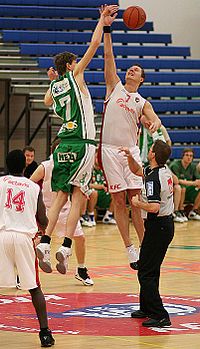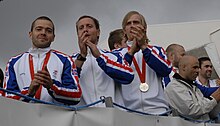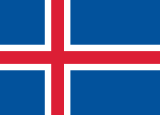| Part of a series on the |
| Culture of Iceland |
|---|
 |
| History |
| People |
| Languages |
| Mythology and folklore |
| Cuisine |
| Festivals |
| Religion |
| Art |
| Literature |
| Music |
| Media |
| Sport |
| Monuments |
| Symbols |

Sports in Iceland are very popular. Popular sports include football, handball, athletics, basketball, chess, golf, volleyball, tennis, skiing, snowboarding, ice hockey, swimming, rock climbing, mountain climbing, horseback riding (specially on Icelandic horses), archery, strongman, powerlifting and crossfit. In some of those sports, namely football, handball, basketball and strongman, Iceland is extremely successful, considering its population. It manages to compete at comparable level with countries that have 10-200 times its population.
Iceland's most famous athlete comes from the world of football. Eiður Guðjohnsen has played in England's Premier League for Chelsea F.C. winning the league title and the Community Shield twice, as well as the League Cup once. He also played in La Liga for FC Barcelona, where he was part of the team that won the Treble of the league, Copa del Rey and the UEFA Champions League in the 2008–09 season.
Athletics

In athletics, shot putter Gunnar Huseby became one of the country's first international champions when he won two gold medals at the European Athletics Championships in 1946 and 1950. Iceland's greatest period of success in the sport was in the 1950s, when Torfi Bryngeirsson was European long jump champion, Vilhjálmur Einarsson was an Olympic and European triple jump medallist, and Örn Clausen was European runner-up in the decathlon. Einarsson is the most decorated person of the Icelandic Sportsperson of the Year award, being a five-time winner.
Vala Flosadóttir, pole vault medalist at the 2000 Summer Olympics, is the country's most successful female track athlete, having set world indoor records and won European and World Indoor medals. Decathlete Jón Arnar Magnússon has also won several international indoor medals. Hreinn Halldórsson was the 1977 European Indoor champion in the shot put (Iceland's sole winner at that competition).
The annual Reykjavík Marathon is held in mid-August with around 10,000 people taking part in the various races on offer. The Laugavegur Ultramarathon, a 55 km running competition, has been held each year since 1997.
Multi-sport events

The Icelandic Olympic team first sent athletes to the Summer Olympics in 1948. Icelandic athletes competed at the 1908 and 1912 Olympics, but these were part of Denmark's delegation (Iceland not being independent at that point). Iceland has been present at the Winter Olympics for all editions since the inaugural 1948 games, bar 1972 when no Iceland athletes were present.
Iceland has won four Olympic medals in its history. The first was Vilhjálmur Einarsson, who won the 1956 men's triple jump silver medal. Bjarni Friðriksson won a bronze medal in 1984 in men's judo and Vala Flosadóttir became the first woman medalist in 2000, taking the pole vault bronze. Iceland's first team Olympic medal was won by the men's handball team at the 2008 Beijing Olympics.
The Icelandic Paralympic team made its debut at the 1980 Summer Paralympics and has sent athletes to the competition for each subsequent edition. It has made only three appearances at the Winter Paralympics. As of 2012, the country has won over sixty Paralympic medals.
Iceland is a regular participant at the Games of the Small States of Europe and it topped the table at the 1997 edition for which it was the host nation.
Strength sports
Main article: Strength athletics in IcelandIcelanders are famous for their immense success in strength sports. Strongman and powerlifting have been Iceland's greatest success in sports on an international level. Iceland has the second most World's Strongest Man championships of any country with nine: Jón Páll Sigmarsson and Magnús Ver Magnússon with four victories each and most recently by Hafþór Júlíus Björnsson, who is also widely regarded as the strongest man to have ever lived. Benedikt Magnússon broke the powerlifting world record deadlift with 460.4 kg (1,015 lb) in 2011 and Hafþór Júlíus Björnsson broke the strongman world record deadlift with 501 kg (1,105 lb) in 2020. Other notable athletes include Hjalti Árnason, Andrés Guðmundsson, Torfi Ólafsson, Kristinn Óskar 'Boris' Haraldsson, Stefán Sölvi Pétursson, Ari Gunnarsson, Páll Logason and Eyþór Ingólfsson Melsteð.
Glíma is a form of wrestling, thought to have originated with Vikings, that is still played in Iceland, and is the national sport in Iceland.
Other sports
The oldest sport association in Iceland is the Reykjavik Shooting Association, founded 1867. Rifle shooting became very popular in the 19th century and was heavily encouraged by politicians and others pushing for Icelandic independence. Shooting remains popular and all types of shooting with small arms is practiced in the country.
Ice and rock climbing are a favorite among many Icelanders; climbing the 4,167-foot (1,270 metre) Þumall peak in Skaftafell is a challenge for many adventurous climbers, but mountain climbing is considered to be suitable for the general public and is a very common type of leisure activity. Hvítá, among many other of the Icelandic glacial rivers, attracts kayakers and river rafters worldwide.
Ice hockey is gaining popularity in Iceland, with 1 in 512 of the population an ice hockey player. They have a larger 'hockey density' than Slovakia (1 in 630 people are players). The Iceland national ice hockey team has risen to 38th in the IIHF rankings, and has recently seen a fourth team added to their domestic league.
Crossfit is also one of the fastest growing sports in Iceland. Most famous athlete is the two times female champion of the crossfit games 2011 and 2012 in Carson City, Anníe Mist Þórisdóttir. Iceland has the second most podium finishers at the Crossfit Games of any country in the sport of Crossfit, with Þórisdóttir finishing first in 2011 and 2012, 2nd in 2014 as well as third in 2017, Katrín Davídsdóttir finishing first in 2015 and 2016, 2nd in 2020 and 3rd in 2018, Ragnheiður Sara Sigmundsdóttir finishing third in 2015 and 2016, and Björgvin Karl Guðmundsson finishing third in both 2015 and 2019.

Iceland is also one of the leading countries in ocean rowing. Icelandic explorer and endurance athlete, Fiann Paul became the world's most record-breaking explorer, and holds the world's highest number of performance-based Guinness World Records ever achieved within a single athletic discipline. As of 2020, he is the first and only person to achieve the Ocean Explorers Grand Slam (performing open-water crossings on each of the five oceans using human-powered vessels) and has claimed overall speed Guinness World Records for the fastest rowing of all four oceans (Atlantic, Indian, Pacific and Arctic) in a human-powered row boat. He had claimed a total of 41, including 33 performance based Guinness World Records by 2020.
Iceland's handball team is one of the top-ranked teams in the world, winning the silver medal at the 2008 Summer Olympics in Beijing, China, and a bronze medal in the 2010 European Championship. Icelandic women are good at football, the national team is ranked eighteenth by FIFA.
Archery as a sport started in disabled clubs in Iceland 1974 and has grown particularly since 2013, buoyed by the opening of a new facility in Kópavogur that year. Archery is one of the oldest Viking sports in Iceland.
In golf, Ólafía Þórunn Kristinsdóttir has played full-time in the LPGA Tour.
See also
References
- Afrek Huseby fylltu unga þjóð stolti (in Icelandic). MBL (1999-02-16). Retrieved on 2014-10-19.
- European Athletics Championships. GBR Athletics. Retrieved on 2014-10-19.
- Listi yfir íþróttamenn ársins frá upphafi: Archived 2013-09-29 at the Wayback Machine (in Icelandic). Icelandic Sport Press. Retrieved on 2014-10-19.
- Vala Flosadóttir. IAAF. Retrieved on 2014-10-19.
- Jón Arnar Magnússon. IAAF. Retrieved on 2014-10-19.
- European Athletics Indoor Championships. GBR Athletics. Retrieved on 2014-10-19.
- Reykjavík Marathon. Reykjavík Marathon. Retrieved on 2014-10-19.
- Iceland at the 1908 London Summer Games. Sports Reference. Retrieved on 2014-10-19.
- ^ Iceland. Sports Reference. Retrieved on 2014-10-19.
- Iceland at the Paralympics. Paralympic. Retrieved on 2014-10-19.
- Gill, Michael (11 March 2019). "The Greatest Strongman of All Time Vs. The Strongest Man Ever". BarBend. Retrieved 8 April 2022.
- Dr. Robert M. Goldman. "2023 International Sports Hall of Fame Inductee Hafþór Björnsson – Induction speech by Dr. Robert M. Goldman". YouTube. Retrieved 17 March 2023.
- "Skotfélag Reykjavíkur". Archived from the original on October 13, 2007. Retrieved September 2, 2007.
- "Iceland's late love for hockey". webarchive.iihf.com. Retrieved 25 June 2019.
- "IIHF.com". Retrieved August 22, 2010.
- Educator, Marc Boyd; Businessman; Columnist, Freelance (2016-07-12). "Team Uniting Nations On Pace To Shatter A World Record In Rowing | Huffington Post". The Huffington Post. Retrieved 2016-10-09.
{{cite web}}:|last2=has generic name (help) - "Freezing Temps and Rotting Hands: Speaking With the Men of the Record-Breaking Polar Row Expedition". Men's Journal. Retrieved 2017-10-04.
- "'Polar Row' exploration team smashes world records in icy north". The Washington Times. Retrieved 2017-10-04.
- "Search Results". Guinness World Records. Retrieved 2020-01-09.
- "Impossible Row team achieve first ever row across the Drake Passage". Guinness World Records. 2019-12-27. Retrieved 2020-01-09.
- "Um bogfimi á Íslandi". Archived from the original on 2013-08-19. Retrieved 2013-05-23.
- "Verð og Opnunartími". Bogfimisetrið. Retrieved 25 June 2019.
- "Nýtt félag og ný æfingaaðstaða | Íslenski bogfimivefurinn". Archived from the original on 2014-05-17. Retrieved 2013-05-23.
| Iceland articles | |||||||
|---|---|---|---|---|---|---|---|
| History |
|  | |||||
| Geography |
| ||||||
| Politics | |||||||
| Economy | |||||||
| Society |
| ||||||
| Sport in Europe | |
|---|---|
| Sovereign states |
|
| States with limited recognition | |
| Dependencies and other entities | |
| Other entities | |
| Sports governing bodies in Iceland (ISL) | ||
|---|---|---|
| Summer Olympic Sports |
|  |
| Winter Olympic Sports |
| |
| Other IOC Recognised Sports |
| |
| Paralympics and Disabled Sports |
| |
| Others Sports |
| |